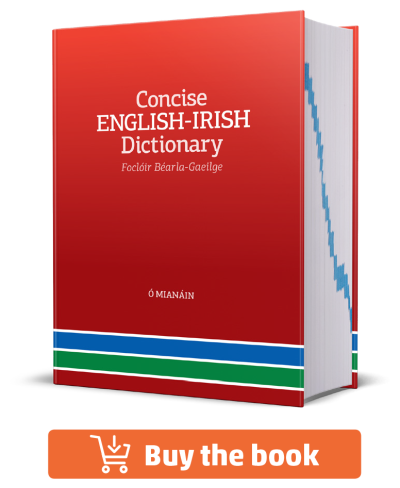Foclóir Gaeilge–Béarla
Ó Dónaill, 1977
An Foclóir Beag
Ó Dónaill & Ua Maoileoin, 1991
English–Irish Dictionary
de Bhaldraithe, 1959
Grammar
Pronunciation
Feabhra
feabhraíd
feabhrán
feabhsaigh
feabhsú
feabhsúchán
feabht
feac
feaca
feacach
feacadh
féacadh
feacaí
feacaíocht
feacanna
féach
féach ar
féach chuig
féach do
féach le
feacha
féachadóir
feachaid
feac1, m. (gs. ~, pl. ~anna). 1. (Of spade, shovel) Handle. ~ láí, handle of spade. 2. Spade. (Var: f, gs. feice)
feac2, m. (gs. ~a). 1. Bent posture; bustle, hurry. ~ na hoibre a chur ort féin, to bend one’s back to the work, to get down to it. Tá ~ anois orm, I am busy now. 2. (In phrase) Do chos a chur i bh~, to plant one’s foot firmly, put one’s foot down. Tá sé i bh~, he has taken a firm stand; he won’t budge.
feac3, v.t. & i. (pp. ~tha). Bend. Do ghlúin a fheacadh, to bend one’s knee. Ní fhéadaim mo chos, mo dhroim, a fheacadh, I can’t bend my leg, my back. Níor fheac sé a ghlúin i láthair Dé, he did not bend the knee before God, kneel to pray. Ní fheacann sé (a ghlúin) d’aon duine, he yields to no man. ~faidh sé é féin an iarraidh seo, he will have to get down to it this time. Ní fheacfainn troigh ar ais dó, I wouldn’t yield a step to him.
PHRASES
IN FOCLÓIR GAEILGE—BÉARLA
~ a chur i bhfeac, i dtaca, i dtalamh, i dteannta, to get a firm foothold, dig one’s feet in.
Cos a chur i bhfeac, i dtaca, i dtalamh, i dteannta, to put down one’s foot firmly, to refuse to budge.
~ glúine, genuflection.
~ i rud, a bend, a twist, in sth.
Ní thig liom filleadh ná ~, ~ ná fiaradh, a bhaint as, I can’t bend it in the least; I can’t make him budge.
Níor bhain sé feacadh ná ~ asam, it did not move me in the least.
~fidh mé feac na láí leat, I’ll take the spade-handle to you.
